-
Class Summary Class Description JsonSchema Represents a top-level schema object bean in the JSON-Schema core specification.JsonSchema.BooleanOrSchemaArraySwap Used during parsing to convert theadditionalItems property to the correct class type.JsonSchema.BooleanOrSchemaSwap Used during parsing to convert theadditionalProperties property to the correct class type.JsonSchema.JsonSchemaOrSchemaArraySwap Used during parsing to convert theitems property to the correct class type.JsonSchema.JsonTypeOrJsonTypeArraySwap Used during parsing to convert thetype property to the correct class type.JsonSchemaArray Represents a list ofJsonSchemaobjects.JsonSchemaMap A container for retrieving JSONJsonSchemaobjects by URI.JsonSchemaProperty Represents a JSON property in the JSON-Schema core specification.JsonSchemaPropertySimpleArray Convenience class for representing a property that's an array of simple types.JsonSchemaRef Convenience class for representing a schema reference such as"{'$ref':'/url/to/ref'}" .JsonTypeArray Represents a list ofJsonTypeobjects.Schema Deprecated Use JsonSchema.Schema.BooleanOrSchemaArraySwap Used during parsing to convert theadditionalItems property to the correct class type.Schema.BooleanOrSchemaSwap Used during parsing to convert theadditionalProperties property to the correct class type.Schema.JsonTypeOrJsonTypeArraySwap Used during parsing to convert thetype property to the correct class type.Schema.SchemaOrSchemaArraySwap Used during parsing to convert theitems property to the correct class type.SchemaArray Deprecated Use JsonSchemaArray.SchemaMap Deprecated Use JsonSchemaMap.SchemaProperty Deprecated Use JsonSchemaProperty.SchemaPropertySimpleArray Deprecated Use JsonSchemaPropertySimpleArray.SchemaRef Deprecated Use JsonSchemaRef. -
Enum Summary Enum Description JsonType Represents possible JSON types in the JSON-Schema core specification.
Package org.apache.juneau.dto.jsonschema Description
JSON-Schema Data Transfer Objects
Table of Contents
1 - Overview
Juneau supports serializing and parsing of JSON-Schema documents through the use of beans defined in the
org.apache.juneau.dto.jsonschema package.
These beans are used with the existing JsonSerializer and
JsonParser classes to produce and consume JSON-Schema documents.
NOTE: JSON-Schema is currently in draft form. This API may change as the JSON-Schema specification changes.
1.1 - JSON-Schema schema definition
The draft JSON-Schema specification that the JSON-Schema beans are modeled after is as follows:
{
The bean classes that make up the model are as follows:
-
JsonSchema- Top level schema object. -
JsonSchemaProperty- A subclass ofSchemafor representing properties. -
JsonSchemaPropertySimpleArray- A convenience subclass ofSchemaPropertyfor representing properties of simple array types. -
JsonSchemaRef- Represents a URI reference to another schema. -
JsonSchemaArray- An array ofSchemaobjects. -
JsonType- An enum of possible JSON data types. -
JsonTypeArray- An array ofJsonTypeobjects.
1.2 - Creating JSON-Schema documents
JSON-Schema documents can be constructed using the Juneau JSON-Schema beans as a document model object. These beans are defined with fluent-style setters to make constructing documents as easy as possible.
The following is an example JSON-Schema document:
{
This document can be constructing using the following code:
The following is a more-complex example showing various kinds of constraints.
{
This document can be constructing using the following code:
JsonSchema s =
1.2.1 - Serializing to other data types
Since the JSON-Schema DTOs are simple beans, they can be used to serialize to a variety of other language types as well as JSON. This also allows JSON-Schema documents to be easily served up using the Juneau REST API.
The sample web application includes a REST resource that generates a JSON-Schema document. We'll use this resource to show what the JSON-Schema document looks like in other languages.
When you point your browser to this resource, the default content type is HTML (since that's what the browser asks for by default).
HTML
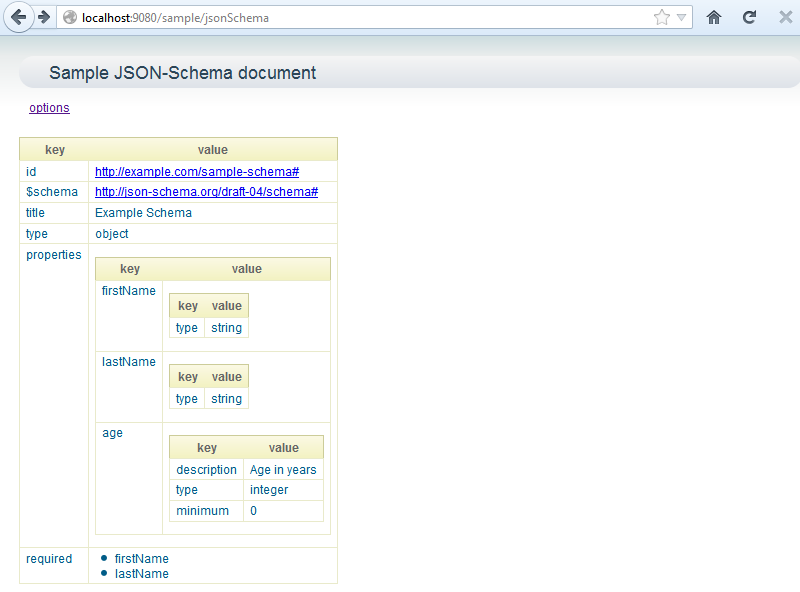
The REST API allows you to specify the Accept header as a GET parameter, and the
plainText=true parameter forces the returned Content-Type to be
text/plain.
We'll use this to view the JSON-Schema document in other languages.
Normal JSON
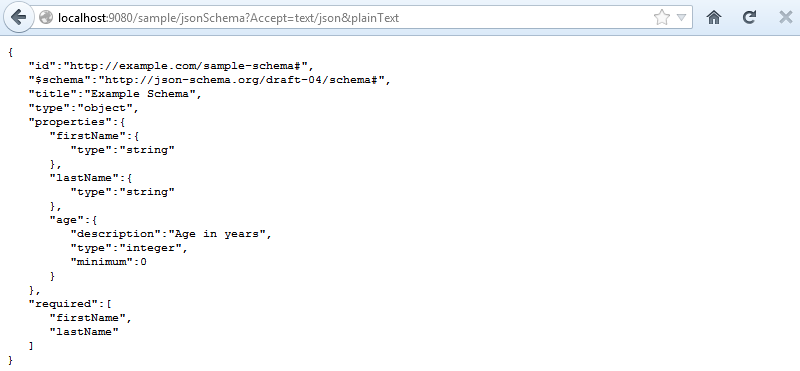
XML
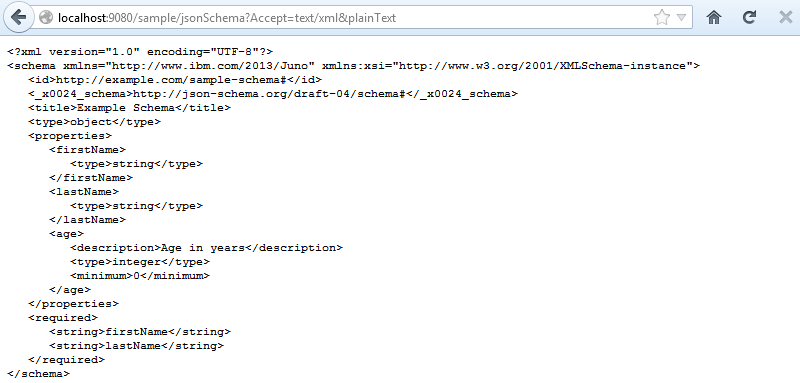
URL-Encoded
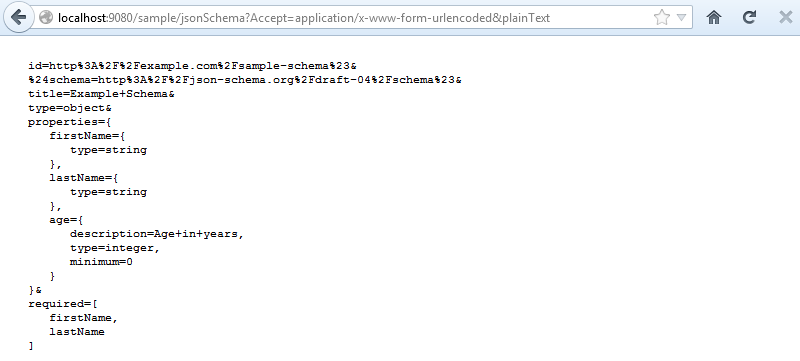
Abbreviated RDF/XML
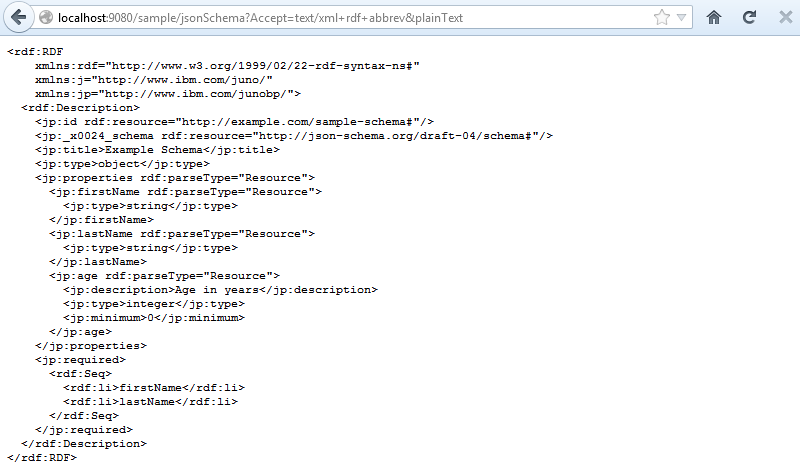
Turtle
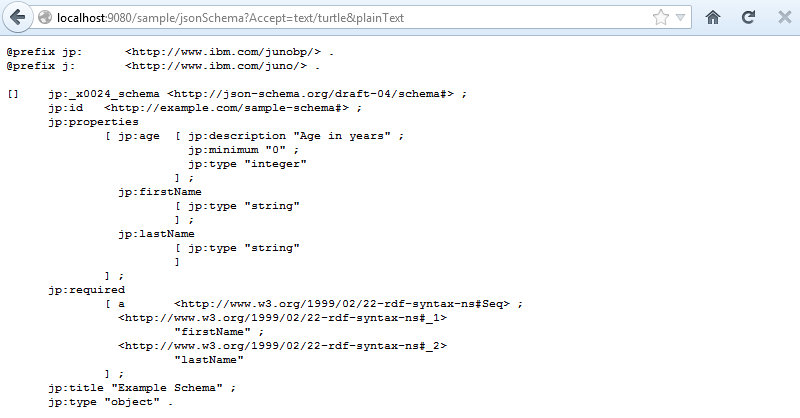
The full list of options for this resource can be accessed by the options link on the HTML
page.
Resource Options
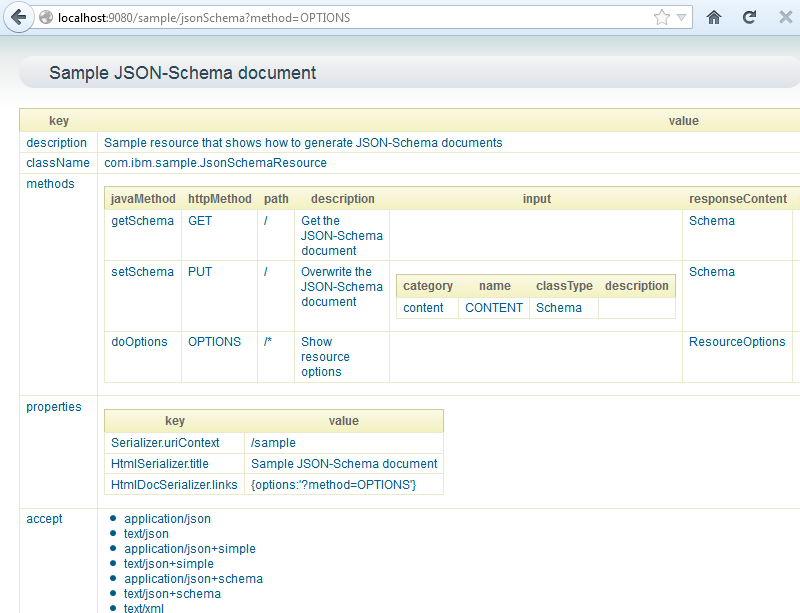
1.3 - Parsing JSON-Schema documents
Use the JsonParser to parse JSON-Schema documents into DTOs:
Schema objects can also be constructed from the other media types using the appropriate parsers.
*** fín ***